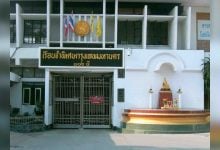Bangkok MP’s challenge to Computer Crime Act dismissed by Constitutional Court

Bangkok MP Rukchanok Srinork, representing the main opposition Move Forward Party (MFP), faced a setback yesterday when the Constitutional Court dismissed her petition concerning the constitutionality of Section 14 of the Computer Crime Act. The court’s decision came via the Criminal Court, which is currently presiding over a case against Rukchanok.
The charges against Rukchanok, stemming from a tweet she posted in July 2020, include an alleged violation of the 2007 Computer Crime Act and the lese majeste law. Her tweet, criticising the then Prayut Chan-o-cha government for a supposed monopoly of Covid-19 vaccine supplies, led to her prosecution. Additional accusations involve a statement expressing displeasure at the monarchy.
Rukchanok, a member of the Clubhouse for Democracy at the time of her tweet, questioned the legality of Section 14 of the Computer Crime Act. This section prohibits the introduction of misleading or fraudulent information into a computer system, particularly if it is defamatory, detrimental to national and economic security, or public safety.
It also includes pornographic content made public. Offenders can face up to five years in prison, a fine of up to 100,000 baht, or both.
Following Rukchanok’s challenge to the law, she requested a legal interpretation of the contentious section. The Criminal Court then passed her request to the Constitutional Court.
In related news last week, a 33 year old Thai man, accused of computer-related crime, was apprehended while attempting to depart from Thailand through Phuket International Airport.
The arrest took place around 10.30pm on November 20, in the international departures hall, according to immigration officers stationed at the airport.
The individual was sought after under arrest warrant No. 197/2566, issued by the Sisaket Provincial Court on August 8. The charges against the man stem from a violation of Section 14 (1) of the Computer Crime Act.
This law prohibits the introduction of distorted, counterfeit or false computer data into a computer system in a manner that could potentially cause harm to the general public. It is important to note that this offence does not fall under defamation as per the Criminal Code. Read more about the story HERE.
Latest Thailand News
Follow The Thaiger on Google News:


























